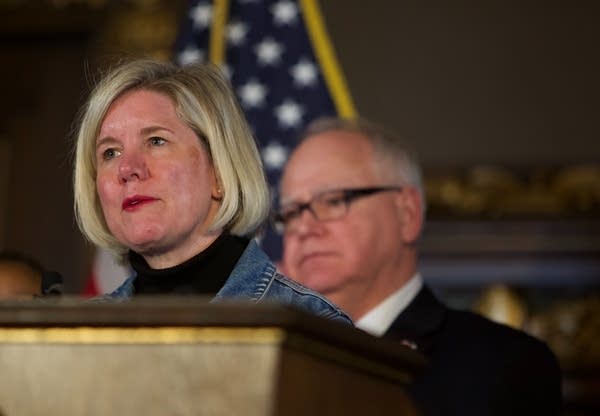Minnesota leaders dust off state quarantine law as COVID-19 spreads

Go Deeper.
Create an account or log in to save stories.
Like this?
Thanks for liking this story! We have added it to a list of your favorite stories.
State leaders are dusting off a law first written almost two decades ago during an anthrax scare that spells out the circumstances and procedures for forced quarantines.
The law has never been invoked, but state lawmakers are taking a closer look at it in case it’s needed in the response to COVID-19.
Back when it was written, the nation reeled from the Sept. 11 terror attacks. Then, anthrax-laced letters began popping up, killing five people and sickening more than a dozen. Government officials in Minnesota and elsewhere asked how to deal with infectious agents that could pose an immediate public health crisis.
At the Minnesota Legislature, then-Rep. Richard Mulder, R-Ivanhoe, stood on the Minnesota House floor with a small bottle of powder to emphasize the threat.
Turn Up Your Support
MPR News helps you turn down the noise and build shared understanding. Turn up your support for this public resource and keep trusted journalism accessible to all.
“There’s also enough anthrax spores in this bottle to infect and kill every person in this state,” he said.
It wasn’t really anthrax, but his point was made. Within months, Minnesota had a new bioterrorism law that also defined how quarantines and isolation would be handled and what rights people under such orders had.
Mulder’s partner in the law, then-Rep. Thomas Huntley, DFL-Duluth, told colleagues it was designed to protect both the public at large and the subjects of quarantine orders.
“A list of things that makes certain that it would be in a safe and hygienic environment and least restrictive method possible,” he said.
People would have to be regularly monitored; be provided adequate food, clothing and shelter; and be freed of restrictions once their risk subsided.
State health officials said this week that the mandatory quarantine power has never been used. Voluntary quarantine has worked so far with people who have tested positive for COVID-19, said state epidemiologist Kris Ehresmann.
“They’ve been very accommodating and willing to abide by our recommendations, which is great,” she said.
Anyone put on quarantine can expect to get fact sheets, access to 24/7 phone consultations and assistance obtaining food, medicine or other items, if no one else is around to provide them.
Ehresmann said health officials won’t hesitate to protect the public and enforce quarantines for those diagnosed with the illness.
“We would definitely do what’s necessary and take the legal action. But that has not been necessary with the cases. What is concerning, however, is that people are not staying home when they’re sick,” she said.
At the Capitol, the law covering quarantine and isolation is creeping back to the forefront.
Sen. Michelle Benson, R-Ham Lake, has directed her staff to write up a memo for top legislators on the law’s origins and authority. She was involved in a 2018 update of the quarantine law that added more conditions, including “severe acute respiratory syndromes” and “influenza that can cause a pandemic.” Both could apply to COVID-19.
“We went through SARS, we went through MERS, we went through Ebola and so we had just had enough experience to say it doesn’t have to be anthrax,” she said.
Benson is chair of the Senate’s health and human services committee. She said the lockdown in Italy to fight coronavirus caught her attention, and she doesn’t want it to come to that here.
“We want people to cooperate because it’s the right thing to do to keep this from spreading to healthy people,” she said. “This would only come into play if there was something quite serious, far beyond what we expect to see here in Minnesota. That’s why we’re so focused on preparation.”
Sen. Scott Dibble, DFL-Minneapolis, was in the House when the initial quarantine law passed. He raised concerns about it back then and said the sentiments he expressed then still apply today.
“We always just need to strike the balance between providing for public safety and security and health and making sure that we uphold what is also very important at the same time: individual rights and freedoms and guard against an overly intrusive governmental power,” he said.
Dibble suspects that proper balance between protecting the public good and protecting individual rights will be tested as more COVID-19 cases are confirmed in Minnesota.


